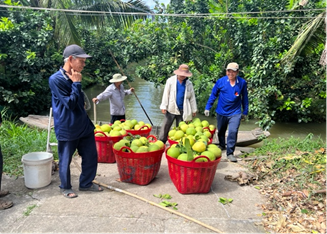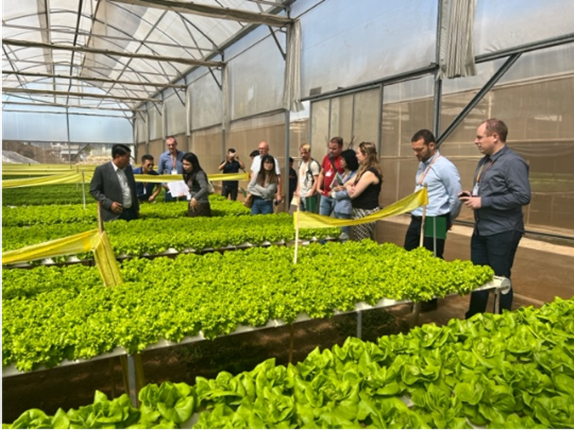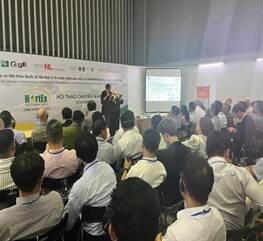Development of organic farming in Vietnam
Vietnam's horticultural sector is embracing organic farming, as the government and farmers make efforts towards sustainability and environmental protection. The Netherlands Embassy in Vietnam held a seminar within HortEx 2023, to promote for collaboration between the two countries towards a sustainable horticulture sector. The Netherlands' expertise in sustainable horticulture can be a valuable asset to Vietnam, promoting knowledge-sharing, technology transfer, and market access. With a focus on organic farming and sustainable horticulture, Vietnam and Netherlands public-private sector can work together towards a brighter and more sustainable future.
Background on organic farming in Vietnam
To meet the demand for high-end organic products, Vietnam has made significant efforts to meet the Sustainable Development Goals (SDGs) by 2030. The government implemented Decree 109/2018/ND-CP in 2018 to regulate organic farming and develop the industry from 2020 to 2030. After three years, the Decree has yielded promising outcomes. Various southern provinces have implemented organic agriculture production models, and Vietnam now ranks in the top ten Asian nations for agricultural acreage suitable for organic farming. The Strategy for Sustainable Agriculture and Rural Development for 2021 to 2030 aims to link agricultural restructuring to new rural development and sustainable practices, promoting value and environmental protection while expanding organic product production and consumption. The Ministry of Agriculture and Rural Development (MARD) is evaluating a new system of standards and regulations to enhance organic fertilizer production and use, with a target of allowing the sale of 25% of organic fertilizers by 2025. These efforts demonstrate Vietnam's commitment to achieving the SDGs and promoting sustainable agriculture.
Trade in organic products
Over the past two decades, the global organic farm products market has grown tremendously, from 18 billion USD in 2020 to 188 billion USD in 2021. The market is projected to reach 208 billion USD in 2022 and is expected to grow at a compound annual growth rate of 14% to reach 437.36 billion USD by 2026. The US and the EU, which have strict sustainability, labeling, and quarantine regulations, account for 90% of the organic goods market.

Vietnam's organic agricultural products have an annual export turnover of 335 million USD and are exported to about 180 countries and territories. Tea, shrimp, rice, cashew nuts, pepper, cinnamon, anise, essential oils, and spices are among the organic exports. Export destinations for these goods are France, Denmark, Switzerland, Sweden, China, Cambodia, the US, Italy, Germany, the UK, Russia, Canada, Belgium, Thailand, Malaysia, the Netherlands, Hong Kong, and Taiwan.
Challenges
Despite of the mentioned bright side, Vietnam organic agriculture is still facing many challenges. One of the primary issues facing organic farming in Vietnam is the lack of organized production chains. Without organized production chains, it is difficult to ensure that organic products meet the necessary standards for certification.
The lack of trust between businesses, farmers, and customers is also a significant obstacle to the growth of the sector. It is crucial to build trust between stakeholders, and this can only be done through the implementation of a well-organized production chain that can guarantee the quality of the products.

Another significant challenge is the reliance on international certifications. Since few institutions in Vietnam check and certify organic farming, most organic certifications must be done by international organizations, making them expensive and challenging to execute, especially for small firms. Additionally, maintaining organic standards after receiving certification has not yet received serious consideration, making it difficult for organic farmers to retain their certification.Another significant challenge is the reliance on international certifications. Since few institutions in Vietnam check and certify organic farming, most organic certifications must be done by international organizations, making them expensive and challenging to execute, especially for small firms. Additionally, maintaining organic standards after receiving certification has not yet received serious consideration, making it difficult for organic farmers to retain their certification.
Cooperation between Vietnam and the Netherlands
Netherlands and Vietnam both have a strong interest in the horticulture sector, with the Netherlands being well-known for its expertise, innovations, and advanced technologies, while Vietnam has significant potential for production and development. With many opportunities for Dutch businesses to contribute to the sustainable development of the Vietnamese horticulture and floriculture sector, the Netherlands Embassy in Vietnam is hosted a seminar titled "Vietnam and the Netherlands working together towards a sustainable horticultural sector."

The seminar took place on 1st of March, 2023 as part of the 5th International Exhibition & Conference for Horticultural and Floricultural Production and Processing Technology in Vietnam, HortEx Vietnam 2023. The session featured experts and industry leaders discussing various topics related to sustainable horticulture, including reducing pesticide use, promoting biological control applications, encouraging organic production, and implementing greener greenhouse practices. The aim of the seminar was to share experiences, knowledge, and ideas to upgrade the horticultural sector to a higher level and contribute to its sustainable development. This session provided organic farming’s the insights on how to maintain organic standards, which can lead to better sales and long-term success.

By exploring solutions to improve the organization of production chains and certification systems, promoting sustainable horticulture practices, and building trust between stakeholders, the seminar has contributed to the sustainable development of the horticulture sector in Vietnam, promoted Netherlands trade in this field, in which Vietnam and Netherlands will benefits for both sides.
Do you have any questions for the agriculture department please send an email to HAN-LNV@minbuza.nl. For the latest updates, news funding opportunities and more follow us on Twitter @AgroVietnam